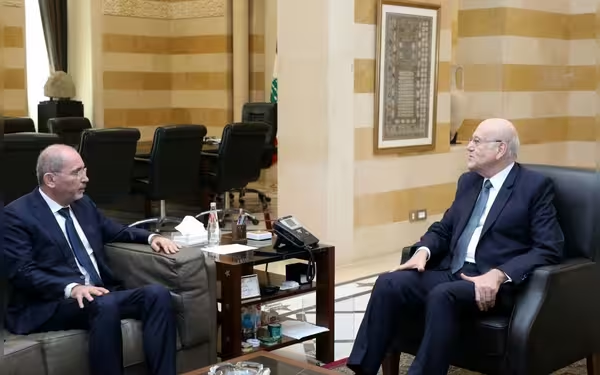Saturday, November 16, 2024 06:32 PM
Jordan's Foreign Minister Warns of Regional War Amid Escalating Tensions
- Jordan's foreign minister fears full-scale regional war.
- Conflict has resulted in over 2,000 casualties.
- Lebanon enhances security amid Israeli military operations.
 Image Credits: arabnewspk
Image Credits: arabnewspkJordan's foreign minister warns of a potential regional war as tensions escalate between Israel and Hezbollah, resulting in significant casualties.
In recent weeks, tensions in the Middle East have escalated dramatically, particularly between Israel and Hezbollah, the Iran-backed militant group based in Lebanon. This conflict has raised alarms about the potential for a broader regional war, a concern echoed by Jordan’s Deputy Prime Minister and Foreign Minister, Ayman Safadi. During a news conference in Beirut, Safadi expressed his fears that the ongoing hostilities could plunge the region into the "abyss of full-scale regional war." His comments come as Lebanon marks the anniversary of violent clashes with Israel, highlighting the ongoing instability in the area.
As of October 7, the conflict has resulted in a staggering death toll of 2,083 individuals, including innocent children, women, and high-ranking Hezbollah commanders. The casualties also extend to members of the Lebanese army, medical personnel, and journalists, underscoring the widespread impact of the violence. Safadi emphasized Jordan's support for Lebanon's government, particularly its initiative to elect a new president and adhere to the United Nations Security Council resolution that aimed to stabilize southern Lebanon after the last war with Hezbollah in 2006.
Safadi reiterated Jordan's commitment to Lebanon's security and sovereignty, stating that the country would not allow itself to become a battleground for any party involved in the conflict. He made it clear that Jordan would not tolerate any violations of its airspace or sovereignty that could jeopardize the safety of its citizens. This strong stance was directed at both Iran and Israel, as Jordan seeks to maintain its own stability amidst the regional turmoil.
In response to the escalating violence, Lebanon's Interior Minister, Bassam Mawlawi, announced enhanced security measures. Transport Minister Ali Hamieh clarified that no aircraft would be permitted to land at Beirut International Airport without military approval, and all vessels involved in military operations must secure permits before docking at Lebanese ports. These measures aim to ensure that Lebanon remains accessible for humanitarian aid while reinforcing security protocols.
The situation intensified further when the Israeli army announced a focused ground operation in southern Lebanon, leading to airstrikes that resulted in the deaths of firefighters and significant destruction in various areas. Israeli forces have warned residents in southern villages to evacuate for their safety, while also targeting locations associated with Hezbollah leaders.
Hezbollah, in turn, has expanded its military operations, launching attacks on northern Israel, including the city of Haifa. Reports indicate that missiles have struck residential areas, causing injuries and damage. This back-and-forth escalation raises concerns about the potential for a wider conflict that could engulf the region.
As the situation continues to unfold, the international community watches closely, hoping for a resolution that can bring peace to a region long plagued by conflict. The ongoing violence serves as a stark reminder of the fragile nature of peace in the Middle East and the urgent need for diplomatic efforts to address the underlying issues fueling this turmoil. The stakes are high, and the consequences of inaction could be dire, not just for the countries directly involved, but for the entire region.













